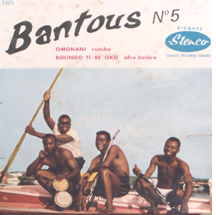|
 Bantous de la Capitale, renowned Congolese rumba band, formed 1959. Notable early members: Jean Serge Essous (born Mossendjo, Congo-Brazzaville, Jan. 15, 1934; died Brazzaville, Nov. 25, 2009; saxophone, clarinet., vocal), Edouard "Edo" Ganga (born Brazzaville, Oct. 27, 1933; vocal), Célestin "Célio" Kouka (born Brazzaville, 1930s; maracas, vocal), Daniel "De La Lune" Lubelo (born Mambenga, Congo-Brazzaville, Mar. 15, 1934; bass), Nino Malapet (born Brazzaville, Mar. 8, 1935; saxophone), Papa Noel Nedule (born Kinshasa, Dec. 25, 1940; guitar), Saturnin Pandi (born Mpita, Congo-Brazzaville, May 31, 1932; died Brazzaville, 1996; congas). Bantous de la Capitale, renowned Congolese rumba band, formed 1959. Notable early members: Jean Serge Essous (born Mossendjo, Congo-Brazzaville, Jan. 15, 1934; died Brazzaville, Nov. 25, 2009; saxophone, clarinet., vocal), Edouard "Edo" Ganga (born Brazzaville, Oct. 27, 1933; vocal), Célestin "Célio" Kouka (born Brazzaville, 1930s; maracas, vocal), Daniel "De La Lune" Lubelo (born Mambenga, Congo-Brazzaville, Mar. 15, 1934; bass), Nino Malapet (born Brazzaville, Mar. 8, 1935; saxophone), Papa Noel Nedule (born Kinshasa, Dec. 25, 1940; guitar), Saturnin Pandi (born Mpita, Congo-Brazzaville, May 31, 1932; died Brazzaville, 1996; congas).
Congo-Brazzaville nurtured a number of first-rate bands, none more important than the luminous Bantous de la Capitale. Four of its musicians, Célestin, Edo, Essous, and Malapet, had started their careers in Brazzaville in the early fifties' band Negro Jazz. Across the river in Kinshasa, Essous and two other Brazzavilleans, De La Lune and Pandi, became founding members of O.K. Jazz in 1956; Edo and Célestin joined the next year. In 1959, with the prospect of independence for the two Congos looming large, these five Brazzavilleans returned home to form Orchestre Bantou.
Important additions, Malapet (who had been in on the founding but unable to join immediately) and lead guitarist Papa Noel Nedule signed on near the end of 1960. As colonial dominos fell in 1960 and 1961, Orchestre Bantou (sometimes called Bantous Jazz) earned a considerable reputation entertaining at independence celebrations and in local night clubs up and down the West African coast. Group recorded several sides at Kinshasa's Esengo studio where Essous, Malapet, Noel, and Pandi had been members of the band Rock'a Mambo. More recording took place in Brussels. Célestin's "Les Bantous de la Capitale" emerged as the band's theme song, and the musicians took the title to be their official name.
Guitar section grew into the threesome of Mpassy Mermans, Gerry Gérard, and Samba Mascott following Papa Noel's departure in 1963. Future stars Pablito (later known as Pamelo Mounk'a) and Kosmos (Côme Moutouari) fortified the vocal corps in the early and mid-sixties. Kosmos's "Ebandeli ya Mosala" (the start of work) and Pablito's "Masuwa" (the boat), a story of parting lovers, were exceptional additions to the band's repertoire. "Danse des Bouchers" (dance of the butchers) by singer Joseph "Mujos" Mulamba launched the boucher dance craze of 1965.
In 1966 the band's leader, Essous, quit in protest over the "revolutionary" Congolese government's increased meddling in the group's affairs. Les Bantous continued to thrive under Malapet's leadership. Essous's return in 1971 was insufficient to prevent a three-way split the following year. Les Bantous re-grouped in the hands of Malapet and Essous; Célestin, Pamelo, and Kosmos became the Trio CEPAKOS; and Edo and Mermans formed Les Nzoi (the bees). A new crop of singers, Lambert Kabako, Théo Blaise Kounkou, José Missamou, and Tchico Tchicaya shored up Les Bantous during the seventies. Almost the entire band, except Célestin and Kosmos, reunited in 1978.
The eighties marked a period of steady decline. By 1986, the Congo-Brazzaville government, viewing the group as a national treasure, felt obliged to come to its aid. Essous's illness and departure for Paris in 1988 signaled another downturn. Several musicians including Edo and Pamelo split off to form Bantous Monument. Essous's return in 1993 sparked momentary optimism, but political uncertainties and eventual civil war in Brazzaville prevented any meaningful work.
Seeming to possess as many lives as a cat, Les Bantous began to re-group in 2003 as stability gradually returned to Congo. In spite of the death of long-time guitarist Gerry Gérard in August 2003, the band played a few live shows, but scarcity of funds meant that any new recording would have to been done intermittently. The outlook improved in 2007 when the band traveled to Europe for a brief tour that included an appearance at the festival Musiques Métisses in France. The line-up of musicians strongly resembled that of the group's best days, with Essous, Malapet, Edo, Kosmos, Célestin, and Mermans all back in the fold. A new CD, Bakolo Mboka, which had been in the works for several years, finally reached the market later in 2007. Les Bantous returned to Europe in March 2009 for appearances in Marseille and the Paris Olympia, but the death of Essous in November 2009 has markedly diminished the band's future prospects.
During the sixties and seventies, Brazzaville's Bantous ranked with Kinshasa's O.K. Jazz, Afrisa, and African Fiesta Sukisa at the top of Congolese music's hierarchy. Many a Brazzaville musician had contributed to the success of Kinshasa's bands, but Les Bantous put Brazza on the map in its own right. An extraordinary number of talented performers passed through the group, and several of its songs are regarded as classics. No matter what the post-Essous period produces, Les Bantous have amassed a formidable legacy.
© 2011 Gary Stewart
SELECT DISCOGRAPHY
Les Bantous de la Capitale (Sonodisc CD36527) sixties recordings reissued 1993; La Belle Epoque (vol. 1 Glenn GM324001) sixties and seventies recordings reissued 1994; Rosalie Diop (Sonodisc CD36569) sixties and seventies recordings reissued 1997; Les Bantous de la Capitale (Sonodisc CD36584) seventies recordings reissued 1997; Compilation Musique Congolaise (Sonodisc CD36591) sixties recordings reissued 1998; Makambo Mibale (Sonodisc CD36592) sixties and seventies recordings reissued 1998; Bakolo Mboka (Cantos 0790031020) 2007.
SELECT BIBLIOGRAPHY
S. Bemba, 50 ans de musique du Congo-Zaire (Paris, 1984); G. Stewart, Rumba on the River (London and New York, 2000).
Thanks to Peter Toll for assistance.
|

